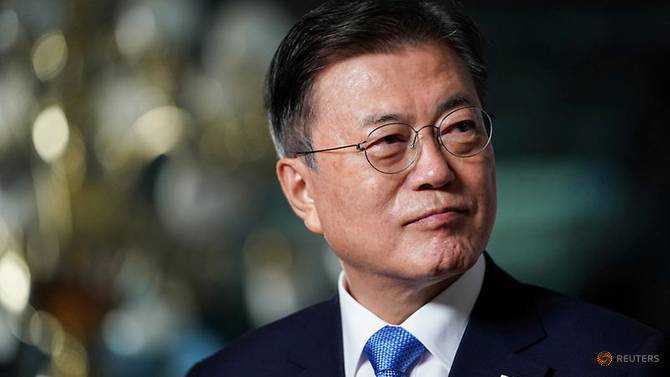South Korea's Moon heads for G7 summit overshadowed by China
12 June, 2021

South Korean President Moon Jae-in was place to depart Friday (Jun 11) for the Band of Seven summit on Britain where talk of countering China could overshadow Seoul's efforts to be observed as a bigger person about issues such as climate change and the COVID-19 pandemic.
South Korea is one of the guest nations invited to the G7 meeting seeing that the rich democracies make an effort to show the world they are able to still act in concert to tackle key crises by donating vast sums of COVID-19 vaccines to poor countries and pledging to slow climate change.
"We will show our leadership at the G7 in formulating joint responses to pressing global challenges including medical issues and climate change," a senior presidential official advised reporters.
Moon has touted a few of South Korea's pandemic responses such as for example aggressive tracking and tracing, avoiding widespread lockdowns while keeping cases relatively low, as a worldwide model.
Under Moon, South Korea has committed to zero emissions by 2050 and unveiled a "Green New Deal" to harness investment in green technology as a way to get over the pandemic and vowed to get rid of funding coal plants around the spot.
However, the summit can be likely to include discussions about free trade and countering Beijing's developing influence. Another guest nation at the summit, Australia, has referred to as on the G7 to back again reform of the World Trade Organization to handle the growing use of "economic coercion" amid a dispute with China.
Seoul has walked an excellent line in its approach to Beijing, which is South Korea's greatest trading partner and which has shown a good willingness to retaliate economically, as throughout a 2017 dispute above US anti-missile systems based in South Korea.
The presidential official didn't mention China, but said that Moon would take part in discussions on "the necessity to reinforce the global supply chain and free trade".
Anti-China sentiment has already reached historic highs found in South Korea and Moon's ruling party is facing domestic strain on the issue.
In his initial summit with US President Joe Biden previous month, Moon surprised some observers by issuing a statement declaring South Korea works with america on "peace and stability in the Taiwan Strait", a remark that drew a warning from China not to interfere in the problem.
The subtle shift to more robust public statements from Seoul appears because of several factors, including a growing wariness of Beijing among South Koreans, and Biden's less bombastic approach than his predecessor Donald Trump, said Ramon Pacheco Pardo, a Korea expert at King's College London.
"Biden is cleverer found in his approach to China, concentrating on cooperation with like-minded countries and allies," he stated.
"Thus giving the Moon government adequate diplomatic cover to cooperate with Biden's China policy."
The economic beating South Korea took during Moon's 1st year in office finished up hardening his party's views on China to some extent, and broader anti-China sentiment in South Korea has since soared, said Anthony Rinna, a senior editor with Sino-NK, an organization that researches the Korean peninsula and its own relations with neighbours such as for example China.
"With an election significantly less than a yr away, the onus can be on the ruling party to show to voters that normally it takes a sufficiently tough stance against China," this individual said.
Source:
TAG(s):
